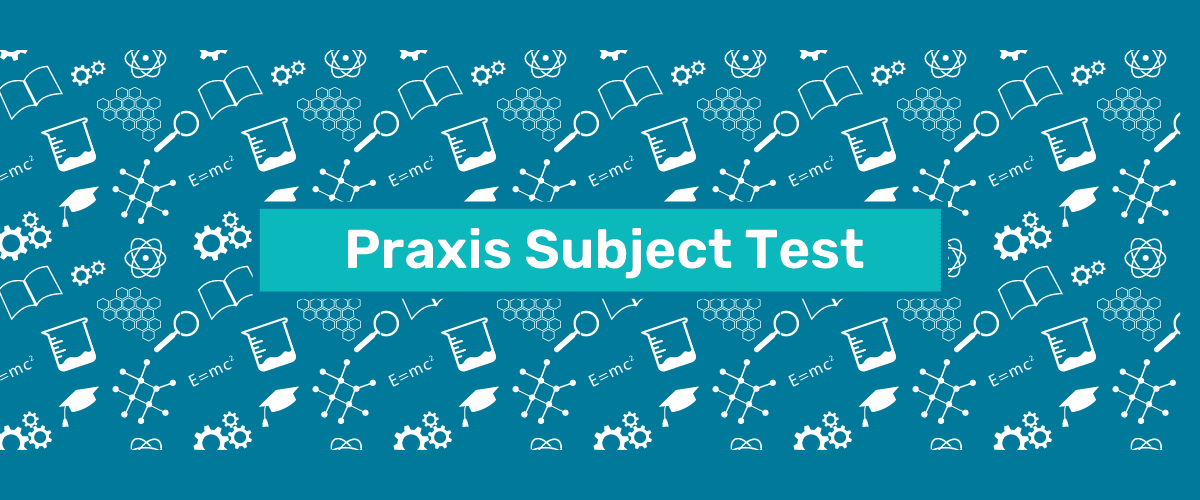
Praxis Subject Test: Everything You Need to Know
Learn all about the test and how to prepare.
Author: Beneisha Williams

Learn all about the test and how to prepare.
Author: Beneisha Williams
If you’re thinking about becoming a teacher, you may have heard you need to take the Praxis Subject Assessment. In fact, teaching programs in more than 40 states require you to take the Praxis Subject test in order to begin working in a classroom or soon after you start.
Does the thought of taking a test overwhelm you? You’re not alone. You work so hard to get into the program, and another test may seem like just another hurdle. But let’s take it step-by-step. Below we’ll cover all things Praxis Subject — what’s included in the test, who the test is for, and what resources are available to help you prepare to ace the test.

The Praxis Subject Test is a computer-based test administered by the Educational Testing Service (ETS) for future K-12 teachers. ETS also administers the SAT, so you may have heard of them! The Praxis Subject test measures both your general teaching skills and your knowledge of the subject you want to teach.
Your specific Praxis Subject test will depend on your state and program requirements. According to ETS, each state has determined its own specific requirements and passing scores (2). To determine what test you need to take, contact your educator prep program and check out your state requirements on the ETS Praxis State Requirements page.
The test you take depends on the subject you are planning to teach. For example, if you are planning to become a middle school math teacher, your program may require you to take the middle school mathematics test. We suggest that you speak directly with your teaching program before registering for the Praxis Subject test, this ensures you are taking the right test and meeting the correct requirements.
Each of the Praxis tests are an important part of completing your program, however, each test serves a different purpose. The Praxis Subject test is designed to show that you know your subject well enough to teach it. You may take it when you graduate with your bachelor’s, when you begin a teaching program, or after you begin teaching. If your degree is in your subject, you may not have to take it at all.
The Praxis Core is more of a college entrance test, like the SAT. Most colleges consider the Praxis Core an eligibility requirement before beginning a teaching program. The Praxis Core is a general skills test covering math, reading, and writing. The purpose of the Praxis Core is to evaluate and measure your knowledge and skill levels in areas that are deemed important for being able to lead a classroom successfully. Check out our Definitive Guide to Praxis Core to learn more about the test.
If you are planning to become a K-12 teacher you will most likely be required to take the Praxis Subject test before completing your teaching program. The test helps your program measure your level of knowledge in your subject area. Programs want to ensure that you have reached a certain level of understanding in your subject area before starting your in-classroom teacher training.
For career changers who are considering becoming a teacher, whether or not you need to take the Praxis Subject test will depend on the requirements in your state. For example in some states, if you already have a degree and coursework related to the subject you want to teach, you may be exempt from the test. For more information, visit the ETS Praxis State Requirements page.

Need to take a teaching test? Get unlimited access to Praxis test prep materials through Study.com.
The Praxis Subject test currently consists of two sets of assessments:
The Praxis Subject test is scored on a 100-200 scale. The average score for most subject areas ranges between 165-179. The specific “passing score” will vary depending on what state you live in. For a better understanding of scoring and test results, check out these two guides provided by ETS:
If you don't pass the Praxis Subject test the first time around, it is not the end of the world. According to Forbes, over 75% of those who take the Praxis test will pass the test (1). There is always time to study more, prepare longer, and give it another try. According to the Praxis Test Retake Policy, test takers are allowed to retake the test 29 days after the previous test date.
If you fail the Praxis Subject test and feel that your test was not properly scored, you are allowed to request a score review. Only short answers and essay questions are allowed to be reviewed. The cost of a score review is $65. You must pay the fee and submit a Score Review Form within three months of your original test date.
You can take the Praxis Subject Test as many times as you need to but you’ll need to wait at least 29 days between testing dates. Although there is no limit to the number of times you can take the test, you will be required to register again along with paying a new registration fee.
When you register for your Praxis Core test, you can request that your scores get sent to your teaching program when they are available. There is no fee associated with reporting your scores. For some states, your test scores will automatically be sent to the state’s teacher credentialing agency (2).
Before registering for your Praxis Subject test, it is important to be mindful of your teaching program deadlines. You want to ensure that you are allowing yourself plenty of time to prepare for the test. In order to register, you must first create an online account. Once you have created the account you can move forward with selecting your desired subject test, date, and location. ETS also offers the option to register by mail or phone. (There may be additional fees for these options) Visit the ETS Registration page to learn more about registering (2).

The cost of your Praxis Subject Test will vary depending on the subject area and the number of tests you are planning to take. The test fees range from $50-$209.
Currently, ETS offers a fee waiver for students who meet the following criteria:
In order to fully qualify for the fee waiver, you must submit the required forms prior to your test dates. You are only allowed one fee waiver per year. Fee waivers are limited each year and issued on a first come first serve basis.
We know how costly testing fees can be. Check out our fee reimbursement program! We cover up to $100 of your expenses when you apply to one of our partner programs.
ETS offers two options for taking the test. You can currently take the test at an official testing center or at home via a remote testing proctor. Both the home and in-person tests cover the same information. Visit the Praxis Location page to find a testing center near you.
If you are planning to take the test on-site, be sure to register for your desired test date in advance. Also, arrive a few minutes early to ensure you aren’t rushing in right before the test start time. The testing center Administrator (TCA) will provide you with all the necessary test equipment and instructions.
Some physical testing centers may require proof of vaccination to enter the testing facility. Please check with your testing center for official health and safety information before your test date.
Yes, you can take the test online. If you are taking the test online (from home) your process will be slightly different. (1) In order to qualify for at-home testing, you must live within the United States, U.S. Territory, or Canada and meet the in-home equipment requirements.
Once you have registered for the test through ETS, you will receive an email with additional registration instructions from ProctorU, the company used by ETS to administer at-home testing. When you have completed the ProctorU registration process, you can then schedule your Praxis Core test.
There are several accommodations available for Praxis Subject test takers. Accommodations include things such as extra testing time, individual testing rooms, interpreters, and braille tests. A full list of accommodations can be found on the Testing Accommodations page.
In order to qualify for accommodations, you must submit an Accommodation Request Form. Accommodations are normally given to test takers with disabilities and health-related needs.
Accommodation requests normally take four to six weeks from the time your required forms have been submitted. Also, accommodations can not be applied to tests that were scheduled before submitting your application and request form.
A sure way to guarantee yourself great results on any test is preparation. According to the Princeton Review, studying a little each day will help you identify tough concepts or weak areas in your knowledge in advance (3). Advance preparation not only helps you to better retain information, but it also helps you to feel more confident. Check out a few key study tips below.

Start Early: The earlier you start the more time you have to study. Once you have decided on your test date, you should begin to study soon after. Because the Praxis Subject test covers one key subject area. You want to ensure you fully understand the subject material.
Create a study schedule: Implementing a study schedule helps to create structure and guidance as you prepare for the test. Whether you are studying for 30 minutes or 1 hour per day. You should carve the time out in advance.
Identify your learning style: In general, there are four types of learning styles (4). This means your brain may retain and comprehend information better, based on it being presented a certain way. See the four learning styles and what study method may work best for your style.
Break bigger areas into little areas: It’s easy to get overwhelmed when looking at the “big picture”, therefore it’s best to divide the subject matter into small parts. The Association for Psychological Science suggests that people learn better when a complex continuous lesson is broken into separate segments (5). For example, if you are taking the Praxis Subject test for Elementary Reading, you could break the subject into the following sections:
Great news! ETS provides a study plan for each subject area. Visit the ETS Test Preparation Materials page to download your study plan.
There is a ton of study materials available for you, however, you want to make sure you are using quality resources. ETS has recommended the following:
In addition to this you can also find study material:
After weeks and weeks of studying, you don't want to forget to prepare for the big day. On the ETS Test Center Testing and At Home Testing pages they have provided a detailed outline of how to prepare for and what to expect on test day. Along with this, we suggest getting plenty of rest the night before, arriving early, and having a quality breakfast.
Do you need more help along the way? We’re here to help you see it all the way through, into a classroom of your own. Once you have passed your Praxis Subject test, you’re on the way to completing your teaching program. If you want more information on becoming a certified/licensed teacher in your area and finding a teaching position check out our Jobs page. We also encourage you to visit our website, our Coaching page, where you can access 1:1 advice and answers from veteran teaching professionals.